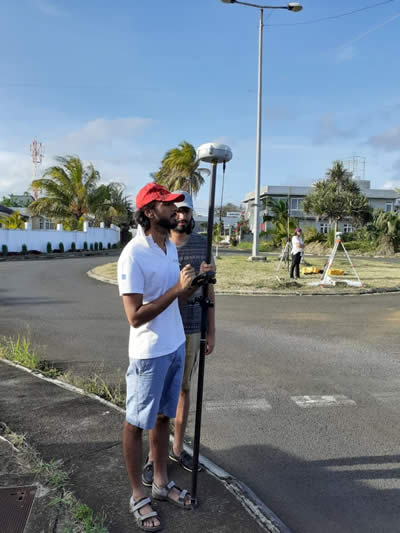
Vivek Bheeroo just returned to his motherland a few weeks ago, after completing his graduation in Coastal & Ocean Engineering from Oregon State University, USA. He is currently preparing for the Fundamentals of Engineering exam, which is the first step towards licensure in the USA and he is looking forward to joining an established Coastal Engineering firm to put into practice the academic knowledge acquired.
Isn’t it a paradox that Coastal Engineering is not such a common field in a country surrounded by water, an island comprising gorgeous coasts? The relevance, which our oceans and beaches holds for us, cannot be underestimated. According to Vivek Bheeroo, the freshly-graduated coastal engineer, Mauritius lacks trained coastal engineers and relies heavily on foreign expertise for conducting coastal engineering analysis and preparing coastal designs. Given the extent of degradation of our coastal zone as well as strategic plans to develop our Ocean Economy, he believes that the government should encourage and empower its institutions to promote the study and implementation of highly applicable and specialized field of Coastal and Ocean Engineering through its tertiary institutions. “High school students with a strong liking for Maths and Physical Sciences should be educated about this field in their quest for choosing future studies and career,” he thinks.

It is common knowledge that a number of coastal sites are currently undergoing protection works ranging from the use of boulders to the recent use of submerged artificial reef structures (reef ball). For Vivek Bheeroo, it is important to, first of all, categorise the coast (sandy, rocky, muddy, cliff) and the health of the natural defense structures (coral reef, coral colonies, sea grass) prior to conducting a full-blown study on the evolution of such coasts over a time line through the use of remote sensing technique (satellite imagery, geospatial technology). “This helps to establish whether the level of degradation is sustained or evolving. This should be followed by a full-scale coastal engineering analysis using oceanographic instrumentation for in situ study as well as conduct numerical model for the region of interest. This will decide the best design approach that will be both aesthetic and functional,” he explains. Hopefully, he adds, Mauritius is following the best practice in coastal engineering work.
Relevance of Coastal Engineering in Mauritius
Mauritius is a Small Island Developing State (SIDS). The naturally occurring sandy, white beaches and turquoise lagoons have proved to be a major pillar in attracting tourists to the island. That is why, according to the young coastal engineer, preserving those coastal areas remains a priority. With the on-going threat posed by climate change, and the associated rising sea level, Mauritius is at a major risk of surrendering precious amounts of coastal geomorphology on an annual basis. “Setting up a strong Coastal Engineering plan based on detailed coastal engineering evaluation and modeling will help to combat the issue. Astute actions and designs can be set up at strategic locations to slow down, halt and possibly reverse the trend in erosion,” he advances.
Zoom on the work of Coastal Engineering
Vivek Bheeroo defines Coastal Engineering as a specialized field of Civil Engineering. It encompasses the study of water processes within the offshore as well as near shore environment. “A fundamental knowledge of Coastal Engineering allows for the understanding of water wave mechanics in and around coastal geomorphologies, including but not limited to beaches of sedimentary nature, headlands, river inlets and bays,” he explains.
High school students with a strong liking for Maths and Physical Sciences should be educated about this field in their quest for choosing future studies and career."
In areas prone to erosion, he continues, Coastal Engineering provides the necessary solutions to protect, preserve and often reverse coastal damage, through an integrated approach involving a combination of soft and hard engineering measures. Accretion of the natural shoreline is generally a desired outcome of such measures. Vivek adds that Coastal Engineering equally extends to other applications such as port development, oil rig platform implementations, marina development but is also of particular interest in research and development of wave energy prototypes, offshore wind farms. Quantifying the wave field and energy flux and modeling its dynamics at such locations enable implementation of appropriate design. The resultant margin of safety is usually significant, as it accounts for wave conditions throughout the year, which includes potential rogue waves.
Four years of study for a licensed coastal engineer
Coastal engineering is a specialized field in the Civil Engineering domain. In the US, four years are required to complete an undergraduate Civil Engineering curriculum including a more focused study in the field of Hydraulic & Hydrologic Engineering in the final year with completion of a project. “This provides appropriate education and knowledge to embark in another two years of graduate studies and research in the field of Coastal & Ocean Engineering,” explains the former student of Le Bocage International School. Fundamentals of Engineering and Professional Engineer are licensures that are requirements in the US for a pathway in the work environment. The process is stringent to ensure engineering practices, which are maintained to the highest level of professionalism.
Message to government
Vivek Bheeroo believes that the Government of Mauritius should include, in its budget and development strategy, the establishment of a specialized department that brings in specialized resources and knowledge to tackle some of the country’s persistent and daunting environmental issues.
Coastal Engineering is one such specialized field that is needed to bring in long-term understanding and monitoring of both climate and human-induced degradation of our coastal/nearshore environment. On the other hand, the potential to sustainably exploit our EEZ and its extended territory through specialized knowledge in the field of Ocean Engineering is enormous. “This goes with opportunities to significantly create specialized and skilled jobs that would make us less dependent on foreign consultants and increase the visibility of our country in the fields of science and technology,” he says.
“As one among many youngsters who have acquired highly specialized knowledge working at renowned institutions and guided by world renowned professors, I wish to obviously contribute to our country’s urgent needs, if the right platform is established,” he concludes.
 J'aime
J'aime














